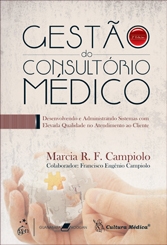 É impossível pra um homem, aprender aquilo que ele acha que já sabe
É impossível pra um homem, aprender aquilo que ele acha que já sabe 
Epiteto (Filósofo Grego, 50-130 a.C)
the medical clinic and the adaptation with contact lenses

The work of adaptation of contact lenses in a medical clinic involves a number of factors that will determine the success of the procedure, as well as the satisfaction of the client that has been served.
This way, I would like to do a quick analysis of the behavioral conditions involving the relation of the patient with the doctor and his clinic’s staff, these relations are the ones to determine the actions, reactions and perceptions of the patient.
By analyzing this dynamic process of interaction of the three elements starting from the moment the patient arrives into the clinic, it can be observed that, still in the reception, way before reaching the doctor, a possible willingness or motivation for the use of lenses can appear already in this instant.
I have witnessed many times patients that while the receptionist was getting their information, they would do questions about contact lenses as such:
- I am thinking of using contact lenses, is it good?
- My girlfriend adapted contact lenses with her doctor, do you think it would work with me?
- I’m afraid of using contact lenses, is it harmful?
- I am thinking of using colored lenses with degree, do you think it would work in my case?
- The other doctor told me that in my case I can’t adapt to contact lenses, is it true? I wanted it so bad.
In any of the situations described above, the lack of preparation of the receptionists might be fatal, as in the case of poorly placed answers, incorrect or inconvenient can undermine the process already from this start, and predispose the client negatively with respect to lenses.
In the following stage, the client is face to face with the doctor, which in short we can basically have two possibilities:
a) The patient takes the initiative and says that he would like to use contact lenses or he asks information about the subject.
b) The doctor after evaluating the case, informs the patient that among the options to correct his condition, there are the contact lenses.
Starting from this stage, the patient has the chance to hear from the doctor the information needed to take the decision of carrying out the contact lenses test.
Then, we enter in a new stage, where the patient will be with the doctor’s assistant who will teach him the basic techniques of handling lenses.
This is a moment of great influence on the patient’s final decision on using contact lenses or not, once during the test, it is common to appear doubts and/or difficulties in relation to the handling of the lens, or sensations provoked by the presence of the lens in the eye.
A badly prepared assistant might lead to the discouragement of the patient towards the use of lenses.
They need to have the right preparation and control necessary to transmit to the patient safety, tranquility, and professionalism, giving the patient a positive perception towards the use of contact lenses.
During the test, it is common the patient to think that:
• He won’t be able to handle the lenses adequately.
• He won’t have enough time in the morning to put his lenses.
• The thought of the presence of the lens in the eye is very annoying.
• The lenses need lots of care.
• etc
Another aspect that should be remembered is the fact that, with the advance of the new bifocal and progressive lenses, it has increased a lot the number of patients with older age who have become interested in the use of contact lenses.
These patients have very own characteristics and usually impose a series of difficulties to the handling of the lenses. One of them is the fact of the difficulty of near vision, a vision required to handle lenses.
Thus, the eyeglasses for near distance becomes an important accessory in these cases, but it adds up one more element to the ritual of handling lenses.
In front of the given, a posture of tranquility and optimism of the assistants is of great importance since initial difficulties with the handling are common, and usually these difficulties are overcome.
We can often observe users of contact lenses comment on their initial difficulties and compare them to their actual agility and dexterity.
We can conclude that the team of assistants that work with the ophthalmologist must be very well prepared, not only technically regarding contact lenses, but also with the techniques and skills to deal with people since they are the essential raw material of work inside the clinics.








